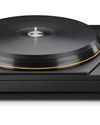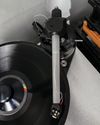
The mass human movement accelerated with the Great Migration, which started about 1910, when millions of African Americans left the Jim Crow South for northern cities. The same human movement that brought the blues to Chicago and jazz to New York City took both to Detroit.
In all those cities, the 1920s was a time of ballrooms and big music halls. In Detroit, "society bands" black and white played through-composed, jazz-inflected music, according to a narrative put together by Cliff Coleman and Jim Ruffner for the local jazz museum.' The proliferation of orchestra chairs meant that skilled musicians familiar with a range of musical styles could find work, especially if they read music.
It also meant that Detroit was ready when, in 1927, Don Redman, who had been the chief arranger for Fletcher Henderson's band, moved to the city to lead William McKinney's Cotton Pickers, the resident Black jazz orchestra at Detroit's Graystone Ballroom.
The Pickers soon became an important touring band, with a national reputation. Big-name orchestras like Duke Ellington's and Fletcher Henderson's started to visit the city; on Monday nights, the national bands would "battle" local bands, according to Coleman and Ruffner's account.
As the '20s yielded to the '30s and beyond, there was a shift across the country away from big bands and toward smaller groups, for obvious economic reasons. In Detroit, this shift was aggravated by other factors, including riots and the decimation of Paradise Valley by so-called urban renewal (a story familiar from other cities including, notably, Memphis). The ballrooms shut down, and entertainment moved into smaller venues throughout the city.
Bu hikaye Stereophile dergisinin September 2024 sayısından alınmıştır.
Start your 7-day Magzter GOLD free trial to access thousands of curated premium stories, and 9,000+ magazines and newspapers.
Already a subscriber ? Giriş Yap
Bu hikaye Stereophile dergisinin September 2024 sayısından alınmıştır.
Start your 7-day Magzter GOLD free trial to access thousands of curated premium stories, and 9,000+ magazines and newspapers.
Already a subscriber? Giriş Yap

Michael Des Barres and the Art of Aural Obsession
Listening to music inspires us to take action. Upon hearing an I.E.-Instant Earworm-we must then determine the best way we can go about listening to it again (and again) at our convenience.

PLANET OF SOUND
BLACK FRANCIS ON HARNESSING THAT MAGIC PIXIES DUST

T+A R 2500 R STREAMING RECEIVER PHONO MODULE
In my review of the T+A R 2500 R receiver (August 2024 issue), I covered many of its features and took as deep a dive as time and column inches allowed.

Audia Flight FLS10
The dogma of separates has long reigned supreme among audiophiles: If you're serious about sound quality, you're supposed to need a dedicated preamp and power amp.

Totem Acoustic Element Fire V2
Totem Acoustic was founded in 1987, in Montreal, Canada, by a former high school math teacher named Vince Bruzzese. The company's first product, the Model 1 loudspeaker,' impressed me so much I bought a pair.

MoFi Electronics MasterDeck
Get two mouthy jazz drummers in a room and watch the sparks fly. Talented turntable designer Allen Perkins, the brain behind Spiral Groove,2 Immedia's RPM turntables,³ and various SOTA models, is first and foremost a jazz drummer.

Soulution 727
AImost 14 years have passed since a review of a Soulution product appeared in the pages of Stereophile.\"

The Spin Doctor checks out the Kuzma Safir 9, a superarm from Slovenia.
The British audio scene from the late 1970s through the mid-1980s was pretty strange. Audio as a hobby was a big deal, with widespread appeal to a much younger crowd than today. Audiophiles were guided by a flurry of what my friends called \"hi-fi pornos,\" audio magazines that filled the racks at the newsagents.

Alex goes to Japan
Arriving in Japan from the United States is like being turned upside down. This condition lasts for much of the first week. When I visited in November, the time difference between Tokyo and New York was 14 hours. \"The floating world\" is a term for the pleasure-addled urban culture of Edo-period Japan, but it's also an apt description for the twilit and not-entirely-unpleasant weirdness of first arriving in Tokyo. Everything seems slightly unreal.

Wilson Audio Specialties The WATT/Puppy
Since the original WATT/Puppy concept kicked off in the late 1980s,' there has been a 40-year evolution leading to the latest version reviewed here.